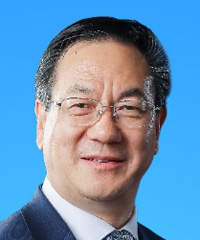Search

Prof. Zhong Lin Wang, Georgia Institute of Technology, USA
K2-1: 10:45-11:30, Oct. 23, 2024, Wednesday
Title: Piezotronics of the third- and fourth-generation semiconductors
Abstract:
The classification of semiconductors is best given based on their crystallographic structures, which are the “DNA”s of general materials. The first generation semiconductors (Si, Ge) and the second generation semiconductors (GaAs) have a common characteristic that their crystal structures are cubic, so they exhibit the highest crystallographic symmetry. For the third generation semiconductors, such as GaN. SiC and ZnO, they have the hexagonal crystal structure. As for the fourth generation semiconductor such as Ga2O3, it has a monoclinic structure. Therefore, the non-centrosymmetric crystal structures at lower-symmetry for the third- and fourth-generation semiconductors make them distinctive different from the Si and GaAs owing to the piezoelectric effect that is generated by the polarization of ions in the crystal. A piezoelectric potential (piezopotential) is generated in the crystal by an externally applied strain. Electronics fabricated by using the inner-crystal piezopotential as a “gate” voltage to tune/control the charge transport behavior is named piezotronics, with applications in strain/force/pressure triggered/controlled electronic devices, sensors and logic units. Using the piezoelectric polarization charges at the pn junction to control charge carrier separation or combination process in optoelectronics is called the piezo-phototronic effect. This talk will focus on how to use piezo-phototronic effect to tune the efficiency of LED lighting and solar cells.
Biography:
Dr. Zhong Lin Wang is the Director of the Beijing Institute of Nanoenergy and Nanosystems, Director, Guangzhou Blue Energy Research Institute, and Regents' Professor and Hightower Chair at Georgia Institute of Technology. Dr. Wang pioneered the nanogenerators field for distributed energy, self-powered sensors and large-scale blue energy. He coined the fields of piezotronics and piezo-phototronics for the third generation semiconductors.
Dr. Wang has received the Global Energy Prize (2023); The Albert Einstein World Award of Science (2019); Diels-Planck lecture award (2019); ENI award in Energy Frontiers (2018); The James C. McGroddy Prize in New Materials from American Physical Society (2014); and MRS Medal from Materials Research Soci. (2011). Dr. Wang was elected as a fellow of the US National Academy of Inventors, foreign member of the Chinese Academy of Sciences, member of European Academy of Sciences, member of European Academy of Engineering, foreign member of Korea Academy of Science and Technology; academician of Academia of Sinica, International fellow of Canadian Academy of Engineering. Dr. Wang is the founding editor and chief editor of an international journal Nano Energy.






 loading......
loading......